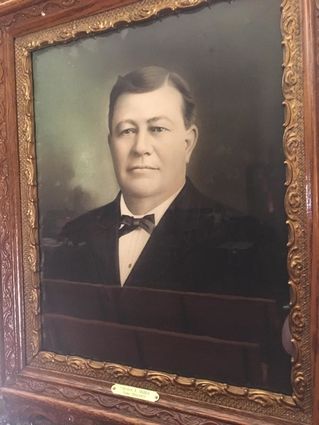Except for mode of transportation, hunting parties of today differ little than those of yesteryear
October 10, 2019

Chronicle photo
This portrait of Judge Chester F. Miller hangs in the Columbia County Courthouse, keeping watch, over the past few decades, of the proceedings of the Superior Court. Miller was one of a handful of local men who hunted and fished in the Blue Mountains, then bothered to make a brief diary of the destinations and activities of the hunting parties.
BLUE MOUNTAINS–Hunters will stream through Dayton on their way to favorite hunting grounds in the Blues this weekend, as they have for over the past 100 years.
From 1889 until 1921, Columbia County Superior Court Judge Chester F. Miller, and a posse of hunting cronies, made annual forays into the forest for the purpose of hunting, fishing, camping and so forth, on saddle horse and with pack string. In later years, some of the party joined up via horseless carriage.
A 10-page, typewritten journal, transcribed from the original diary kept by Judge Miller, was made by Doug Keating, whose grandmother, Mrs. C.A. Booker, received a copy from Judge Miller's wife, in 1925. Subscriber Marty Hall discovered a copy of the diary in a stack of magazine that he found in an old house.
Miller served on the bench from 1900 until about 1921 or 1922. The footnote in this diary indicates that Miller's final hunting and fishing trip was in 1921. He was diagnosed with cancer and resigned while undergoing treatment. "Following apparently successful surgery at Portland, he was re-elected to his former judicial post and was in office at the time of death," Keating wrote. Miller died in December, 1924, at the age of 64.
The hunting-fishing expeditions began with Miller and five friends heading for the hills in September, 1889, and the trips continued annually until 1897, when the Spanish-American War interrupted it for one year. Miller was a captain in Dayton's Company F of the First Washington Volunteer Infantry, mustered into service May 11, 1898.
The regiment sailed to the Philippines in October, 1898, but Miller became ill. First Lt. Charles A. Booker assumed command and led the company in infantry engagements at Santa Ana, San Pedro Mocate, Pasig, Taguig, Pateros and Colomba, Keating's footnotes indicate.
The group resumed in the summer of 1899 and into the Twentieth Century, taking different routes into the mountains every year, but hitting usual springs, campsites and landmarks over the years. Sometimes the troop dwindled to just two, but in 1914, 22 were in the party, including "Holly" the cook.
That group, which hit the trail August 15, 1914, included: C.F. Miller, J.J. Edwards, J.L. Wallace, M.D. Rinehart, J. H. Swart, H.H. Williams, A.J. Knight, Chris Stadfeld, Dr. C.H. Day, E. L. Gard, Henry Patrick, R. L. McCroskey-Colfax, L.A. Closuit, M.C. Martin, E.E. Halsey, Dr. E. D. Sawyer, I.A. Brazeau, George Kinnear, H.H. Farrish, Pearl Hirzel, Dr. J. McElwain and "Holly."
Miller noted that the string started on Saturday, August 15, 1914, into the Blues on Jim Creek Trail, and made stops at Stockade Spring, Godman Spring and Gilham Creek. They were at Twin Buttes and traveled Grizzly Bear Trail and Tillicum Roost. Miller writes "Established camp."
From there, some rode to the mouth of Crooked Fork and brought up the "Asotin bunch."
After apparently a week on trail and in camp, Miller writes that with R.L. McCroskey of Colfax and H. H. Williams, he "climbed hill from Grizzly Bear to Elgin Road." They went to a place known as Elk Flats where they had dinner with Jim Allen and "Rangers and Sheepherders" on Friday, Aug. 21.
Must have been some discord there as the judge's notes indicate "Big fight."
The next day, Miller's diary indicates that Dr. Day, E.L. Gard, McCroskey and M.D. Rinehart "started home.
The following Tuesday, the twelfth day on the trail, "took Asotin bunch down to mouth of Fairview Creek, climbed hill to Richmond Cabin, camped, next day went cross country to spring near Weller Buttes; Camped with Will Kendall.
"Next day started home, took dinner at McBain Spring; camped here also; next day Mud Spring; Stockade; Jim Creek; Home. 14 days." Miller wrote.
He rode "Cahill's Bill," which may have been Alph Patrick Cahill's horse. Cahill had been a member of the party in 1897, 1902 and 1903. Cahill was one of Dayton's premier citizens, engaged in milling and merchandising, then, in 1909, helped with organization of the Broughton National Bank of Dayton.
Other notes by Miller, as he sums up the two-week trail ride, are curious at first. "Hiyu fish." Hiyu, according to the dictionary, means "a party or gathering" in Chinook Indian language.
Miller continues: "Grouse. Pheasants." possibly indicating that the party enjoyed a variety of freshly killed game or caught fish.
"[J.J.] Edwards, [A.J.] Knight, and [Chris] Stadfeld best fishermen. Edwards and [H.H.] Williams best grouse hunters. [E.L.] Gard, [Dr. C.H.] Day and [M.D.] Rinehart best poker players."
Miller adds: "'Lest We Forget' ran short." for reasons unknown. Perhaps the group included a number of Spanish-American War veterans who either unmercifully kidded one another, or the strain of 14 days of camping showed among former brothers in arms.
It is sure that good-natured cajoling was rampant, especially in Miller's next comment: "Judge Halsey took his annual bath." and "George Kinnear started a song 'You had better be home with the girl you love so much, than travelling around the country with the G-d D----d Dutch.'"
Like most camping trips, the language was probably salty.
Miller capped the commentary by noting that Henry Patrick was the "boss packer," and Holly was the cook.
Perusing the trips year by year, it appears that Miller and his cronies weren't in a rut. The first year, 1889, they went up Robinette Mountain, to the head of Wolf Fork, Table Mountain, and other locations on their way to Elgin then back to Walla Walla and home.
In 1891, the group of eight included Lewiston, Cottonwood, Whitebird, John Day Creek, Little Salmon River, Grangeville and back through Lewiston and Pomeroy to Dayton...a camping trip of 28 days. The length of the outings varied from as little as three days in 1902 to the 1891 marathon of 28.
A second excursion into the mountains in 1914, with four in a hunting party including Eugene Pettyjohn, Lloyd Black and T.D. Pettyjohn, was only four days. They left Pettyjohns on Sept. 12, 1914, traveled up to Spackman Mountain to Tate's, crossed the Touchet and went up on Will White's to Robinette. It snowed and the party camped two nights. They set out on old Hogback Trail until they were a mile from Godman Spring and it snowed every day they were there, accumulating to 14 inches. Miller's diary indicates they started home and "dried out at Payne Cabin" and got to civilization on September 16.
In 1895, Miller's party of J.L. Black, W.W. Ward and Sid Atwood were in the Wenaha when they encountered Levi Ankeny and his party of trail riders. They joined up and went to Elk Flats, bear Creek Falls and Jarbo Meadows where they hunted bear with Jarbo and his dogs. Ankeny was a U.S. Senator with financial interests in Walla Walla and Spokane.
The year after the Spanish-American War, 1899, the "yellowjacks [were] thicker than hell."
In 1912, the notable event was that a packhorse rolled on Devil's Staircase, and the horse Miller rode became lame. The next year, some of the pack horses ran off at Twin Buttes, later to be caught at Gilham Creek.
In 1916, the party of seven included Garfield County Judge C.A. McCabe. They started at Stockade Springs on August 14, 1916, went to Godman, Twin Buttes and stopped at Lodge Pole Springs for dinner. "Got lost in the buck brush where trail leaves for Pine Crest," Miller writes. "Wallace proves a hero and finds trail."
There's some rain and lightning strikes a tree near camp, he notes.
They ate well, it appears. "Bill of Fare, Fried rainbow trout, fried Blue Grouse, Grouse pot pie and dumplings, green corn on the cop, string beans, potatoes. Biscuit and honey. Huckleberry short cake. Cheese and coffee."
Trips in 1917, 1918 and 1919 were not made due to the Great War, but resumed with a seven-man party in 1920, H.H. Williams, W. B. Ingram and Nick Longen taking the pack train and wagon to Godman Spring with the rest of the party following in automobiles, alleviating the arduous trail ride from town.
They camped at Pine Crest and "caught an abundance of fish, smoking two sacks full." A cougar serenaded them and they hunted deer and grouse. On the eighth day it rained hard but the party broke camp and trekked through wet brush, arriving at Godman at 4 p.m. Tents went up in the rain and the next day "Burkhart" arrived in a car to take Miller, Edwards and Godard to town while Ingram and Longen followed with the wagon and pack string. "Barring the rain, had a pleasant trip," Miller wrote.
Miller's final trip was in 1921, and he was exceedingly wordy. Here's the entry in its entirety.
Group: J.J. Edwards, H.H. Williams, W.B. Ingram, Nick Longen, J. Hastings, Tate, C. F. Miller, L.A. Closuit, Pearl Hirzel, McCarty.
"Williams, Ingram and Tate left in morning with pack train, going up Touchet to Literal Trail; Miller, Edwards, and Hastings went in car in afternoon while Longen rode from ranch. Camped overnight at Kendall's road camp at Wild Cat Sprs; In morning packed up and went by way of Twin Buttes and then switched to Dexter Trail, arriving at the Wenaha at 12:50; ate lunch and then repacked going down Wenaha to Tillicum Roost where it began to rain and camp was established; Large brown bear jumped into trail just ahead of party and ran up the rim-rock near Veiled Princess Rock, where Williams fired two shots, missing bear; Next day the fishermen saw three cub bear; Sunday morning went down Wenaha and climbed hill to Mallory's and brought Closuit, Hirzel and McCarty up to camp; Saw Dr. Gilbert and party at mouth of Butte Creek; Monday put horses on sidehill north of camp; Ten head left for home during the night; On Tuesday boys hunted horses and Wednesday morning Tate left for Dayton to look up horses, taking the two that were left; The boys fished and hunted until Sunday evening; smoking two sacks of fish and having numerous grouse pot pies; Monday morning, Edwards, Ingram and Williams started for Dayton by way of Grizzly Bear Trail, on foot, walking to Mud Springs, where they were met by a car. Ingram was treed by a white face bull on Grizzly Bear Flat; Richman and boys were in camp several times; Reuben from Lapwai was camped above Watkins Glen and visited camp; Some Umatilla Indians were camped at Wenaha Forks; Al Davis and party from Lewiston were camped near Fairview; Also Dr. Sherfey and party from Pomeroy below Fairview, visiting our camp the morning we left; Kinney, Manning and party of women were camped at mouth of Beaver Creek and Henry Zuger with some women at the forks. Tate arrived Wednesday the 23rd and took Asotin people to Mallory's; Morning of 24th borrowed Manning's pack train and went up Dexter Trail to Kendall's; Camped overnight and next morning loaded packs on truck and was met at Godman Spr. by Williams with car. Arrived home at noon. Rode Billy Day. Tate was failure. Some of the horses still in the mountains."







